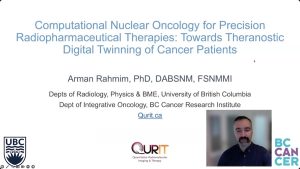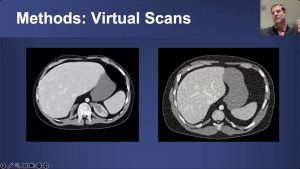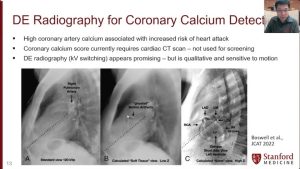FORUMS
Educating and training scientists on how the Center’s resources can aid their research

Forums are currently conducted in person and on Zoom. Please get in touch with our administrative manager to request an invite.
Request an invite
Upcoming Forums
June 20, 2025. Ultrasound Imaging as Encoded Sensing: A Unifying Computational Imaging Framework
 Nick Bottenus from the University of Colorado, Boulder, will discuss his research focused on developing system-level solutions to problems in diagnostic ultrasound imaging.
Nick Bottenus from the University of Colorado, Boulder, will discuss his research focused on developing system-level solutions to problems in diagnostic ultrasound imaging.
Past Forums
Computational Nuclear Oncology for Precision Radiopharmaceutical Therapies: Towards Theranostic Digital Twinning of Cancer Patients
 (May 16, 2025) Dr. Arman Rahmim from the University of British Columbia outlines the vision of and efforts towards realization of theranostic digital twins to enable predictive dosimetry and personalization of therapies, delivering maximum radiation doses to tumors while sparing organs-at-risk.
(May 16, 2025) Dr. Arman Rahmim from the University of British Columbia outlines the vision of and efforts towards realization of theranostic digital twins to enable predictive dosimetry and personalization of therapies, delivering maximum radiation doses to tumors while sparing organs-at-risk.Photon-counting CT in Abdominal Imaging: Hype or Actual Utility?
 (April 18, 2025) Dr. Benjamin Wildman-Tobriner from Duke University discusses current research in photon-counting CT (PCCT) in abdominal imaging and highlights areas where virtual trials in PCCT might be useful moving forward.
(April 18, 2025) Dr. Benjamin Wildman-Tobriner from Duke University discusses current research in photon-counting CT (PCCT) in abdominal imaging and highlights areas where virtual trials in PCCT might be useful moving forward.CT-based Body Composition: The Sky is the Limit
 (March 21, 2025) Dr. Kirti Magudia from Duke University demonstrates how CT-based body composition analysis techniques using deep learning provide quantification of skeletal muscle, visceral fat, and subcutaneous fat, which have been correlated with overall survival, cancer-related outcomes, and cardiovascular events, among other clinical outcomes.
(March 21, 2025) Dr. Kirti Magudia from Duke University demonstrates how CT-based body composition analysis techniques using deep learning provide quantification of skeletal muscle, visceral fat, and subcutaneous fat, which have been correlated with overall survival, cancer-related outcomes, and cardiovascular events, among other clinical outcomes.Equitable AI for Children’s Health and Rare Diseases
 (January 17, 2025) Dr. Marius George Linguraru from the Children’s National Hospital gives an overview on how artificial intelligence may be the greatest tool we have for improving the quality of and access to medical care for children, especially those most vulnerable to health inequities.
(January 17, 2025) Dr. Marius George Linguraru from the Children’s National Hospital gives an overview on how artificial intelligence may be the greatest tool we have for improving the quality of and access to medical care for children, especially those most vulnerable to health inequities.Coronary Artery Calcium Detection from Dual-Energy Radiography
 (November 15, 2024) Adam Wang from Stanford University gives an overview on how coronary artery calcification (CAC) is a key indicator of cardiovascular risk and is currently measured using cardiac CT.
(November 15, 2024) Adam Wang from Stanford University gives an overview on how coronary artery calcification (CAC) is a key indicator of cardiovascular risk and is currently measured using cardiac CT.
